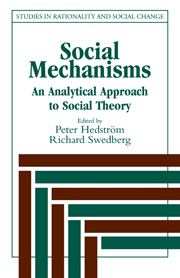Book contents
- Frontmatter
- Contents
- ACKNOWLEDGMENTS
- LIST OF CONTRIBUTORS
- 1 Social mechanisms: An introductory essay
- 2 Social mechanisms and social dynamics
- 3 A plea for mechanisms
- 4 Real virtuality
- 5 Concatenations of mechanisms
- 6 Do economists use social mechanisms to explain?
- 7 Social mechanisms of dissonance reduction
- 8 Social mechanisms without black boxes
- 9 Is sociological theory too grand for social mechanisms?
- 10 Theoretical mechanisms and the empirical study of social processes
- 11 Monopolistic competition as a mechanism: Corporations, universities, and nation-states in competitive fields
- 12 Rational imitation
- AUTHOR INDEX
- SUBJECT INDEX
11 - Monopolistic competition as a mechanism: Corporations, universities, and nation-states in competitive fields
Published online by Cambridge University Press: 24 March 2010
- Frontmatter
- Contents
- ACKNOWLEDGMENTS
- LIST OF CONTRIBUTORS
- 1 Social mechanisms: An introductory essay
- 2 Social mechanisms and social dynamics
- 3 A plea for mechanisms
- 4 Real virtuality
- 5 Concatenations of mechanisms
- 6 Do economists use social mechanisms to explain?
- 7 Social mechanisms of dissonance reduction
- 8 Social mechanisms without black boxes
- 9 Is sociological theory too grand for social mechanisms?
- 10 Theoretical mechanisms and the empirical study of social processes
- 11 Monopolistic competition as a mechanism: Corporations, universities, and nation-states in competitive fields
- 12 Rational imitation
- AUTHOR INDEX
- SUBJECT INDEX
Summary
Mechanisms in competitive social fields with relatively stable rankings
The mechanism developed in this chapter models competitive fields with areas of monopoly controlled by corporate groups. The mechanism is to explain autocorrelation of profits, prestige, and power of highly ranked corporate groups in those fields. To show the generality of such a mechanism, I illustrate it by applying it to profits of large corporations, prestige of distinguished universities, and power of large rich nation-states.
I have defined mechanisms before (Stinchcombe 1991) as bits of “sometimes true theory” (the phrase is due to James S. Coleman 1964, pp. 516-19) or “model” that represent a causal process, that have some actual or possible empirical support separate from the larger theory in which it is a mechanism, and that generate increased precision, power, or elegance in the large-scale theories. Here the combined mechanisms of monopoly power and competitive environments have autonomous theoretical and empirical support, especially in economics. Separate measures of the monopoly power of particular firms have been developed, especially in Tobin's q-ratio. It is crucial of course that not all firms have equal monopoly power, so it is worthwhile for us to theorize about the inequalities of rank derived from differential monopoly power in this chapter.
Our argument then is that monopolistic competitive fields with differentiated monopolies that account for the continuity of status of corporations in markets, of universities in prestige systems, or of nation-states in world power systems have mechanisms that are closely analogous.
- Type
- Chapter
- Information
- Social MechanismsAn Analytical Approach to Social Theory, pp. 267 - 305Publisher: Cambridge University PressPrint publication year: 1998
- 22
- Cited by

